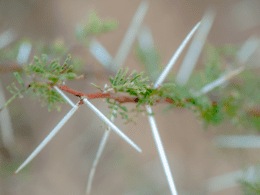Are you tired of those pesky squirrels raiding your fruit trees and ruining your harvest? Don’t worry, we’ve got you covered! In this article, we will show you how to keep squirrels out of your fruit trees and protect your precious crop.
First, you need to identify the entry points that squirrels use to access your trees. Once you’ve found them, it’s time to install physical barriers like metal mesh or tree wraps to keep them out.
Additionally, using squirrel-repellent sprays can deter these furry intruders from getting close to your trees.
If you prefer natural methods, there are several deterrents you can try, such as sprinkling cayenne pepper or using predator urine around your trees.
It’s also essential to remove any attractive food sources that may attract squirrels to your yard.
Creating distractions with squirrel-proof feeders can divert their attention away from your fruit trees.
And if all else fails, don’t hesitate to seek professional help to effectively deal with the squirrel problem.
With these tips, you can enjoy a bountiful harvest without worrying about squirrels invading your fruit trees. Get ready to protect your trees and savor the delicious fruits they bear!
Quick Summary
- Identify and block entry points that squirrels use to access fruit trees
- Install physical barriers such as metal mesh or tree wraps to prevent squirrel access
- Use squirrel-repellent sprays with unpleasant scents or tastes to deter squirrels
- Consider using natural deterrents like cayenne pepper or predator urine to keep squirrels away
Identify Squirrel Entry Points
You’ll want to start by checking for any small openings or gaps in your fruit tree branches where squirrels could easily climb up and access the fruit. Identifying common entry points is crucial in keeping squirrels out of your fruit trees.
Look for any holes or cracks in the branches, as well as areas where the branches may be close to fences or other structures that squirrels could use as a bridge. It’s important to monitor squirrel activity around your fruit trees to determine where they are gaining access. Keep an eye out for signs of squirrels, such as chewed branches or droppings.
Once you have identified the entry points, you can take steps to block them off. Use wire mesh or tree wraps to cover any openings, ensuring that they’re secure and sturdy. Trim any overhanging branches that provide easy access for squirrels.
By identifying and blocking these entry points, you can effectively keep squirrels out of your fruit trees and protect your harvest.
Install Physical Barriers
To deter squirrels from accessing your fruit trees, consider installing physical barriers such as mesh or wire netting. These barriers act as a protective shield, preventing squirrels from reaching your delicious fruits. While there are alternative methods available, homemade barriers can be an effective and budget-friendly solution.
One option for a homemade barrier is to create a collar around the trunk of the tree using metal flashing. Cut the flashing into a strip and wrap it around the trunk, making sure it extends at least 2 feet above the ground. This will prevent squirrels from climbing up the tree.
Another alternative method is to use PVC pipes. Create a frame around the tree using PVC pipes and secure it with connectors. Attach mesh or wire netting to the frame, ensuring that there are no gaps for squirrels to squeeze through. This will create a physical barrier that squirrels cannot overcome.
Here is a table summarizing the different methods for installing physical barriers:
| Method | Description |
|---|---|
| Mesh netting | A fine netting material that can be wrapped around the entire tree, keeping squirrels out while allowing air flow. |
| Wire netting | A stronger option, wire netting can be installed around the tree to create a sturdy barrier against squirrels. |
| Metal flashing | This can be wrapped around the trunk of the tree to prevent squirrels from climbing up and accessing the fruits. |
By installing physical barriers like mesh or wire netting, you can protect your fruit trees from pesky squirrels and ensure that your harvest remains safe.
Use Squirrel-Repellent Sprays
One effective way to discourage squirrels from bothering your fruit trees is by using squirrel-repellent sprays. These sprays are designed to create an unpleasant scent or taste that squirrels find repulsive, deterring them from coming near your trees.
There are a variety of commercial repellent sprays available on the market, but if you prefer a more natural approach, you can also make homemade repellent recipes. These recipes often include ingredients like hot peppers, garlic, or vinegar, which can help to repel squirrels without causing harm to the fruit or the environment.
When using squirrel-repellent sprays, it’s important to follow the instructions provided by the manufacturer or the recipe. Apply the spray directly onto the fruit trees, focusing on the areas where squirrels are most likely to climb or access the trees. It’s recommended to reapply the spray after rain or every few weeks to maintain its effectiveness.
Some people also consider using ultrasonic devices as a squirrel repellent. These devices emit high-frequency sounds that are unpleasant to squirrels and can deter them from your fruit trees. However, the effectiveness of ultrasonic devices may vary, and it’s important to do thorough research and read reviews before investing in one.
By using squirrel-repellent sprays or homemade repellent recipes, along with other preventive measures, you can help protect your fruit trees from pesky squirrels and enjoy a bountiful harvest.
Try Natural Deterrents
Using natural deterrents can help create a squirrel-free environment for your flourishing fruit trees. Here are five effective homemade deterrents that can keep those pesky squirrels away from your precious fruits:
-
Cayenne Pepper: Sprinkle cayenne pepper around the base of your fruit trees. The strong scent and taste will deter squirrels from approaching.
-
Garlic and Onion Spray: Create a concoction by blending garlic and onion with water, then spray it onto the fruit trees. Squirrels dislike the pungent smell, keeping them at bay.
-
Predator Urine: Purchase predator urine from a hunting supply store and sprinkle it around the perimeter of your fruit trees. The scent of predators will discourage squirrels from coming near.
-
Aluminum Foil Strips: Hang aluminum foil strips from the branches of your fruit trees. The shiny and reflective surface will startle and scare away squirrels.
-
Netting: Cover your fruit trees with netting to physically block squirrels from reaching the fruits. Ensure the netting is securely fastened to prevent any sneaky intruders.
It’s important to note that different fruits have varying levels of attractiveness to squirrels. Apples, peaches, and plums tend to be more enticing, while citrus fruits and pears are less appealing. Experiment with different deterrents to find what works best for your specific fruit trees. Keep in mind that homemade deterrents may need to be reapplied periodically to maintain their effectiveness. By using these natural deterrents, you can protect your fruit trees and enjoy a bountiful harvest while ensuring the safety of both your family and the squirrels.
Remove Attractive Food Sources
When it comes to protecting your flourishing fruit trees, eliminating tempting food sources is key. Squirrels are notorious for raiding fruit trees, but by removing attractants, you can ensure the safety of your harvest.
Start by cleaning up fallen fruit on the ground, as this can be a major temptation for squirrels. Rake up any fallen apples, pears, or other fruits and dispose of them far away from your trees.
Additionally, keep your garbage cans securely sealed to prevent squirrels from rummaging through and finding food scraps. It’s also important to trim any branches that hang too close to your trees, as squirrels can jump from nearby trees onto your fruit-laden branches. By pruning these branches, you make it more difficult for squirrels to access your precious fruit.
Another effective method is to use tree protectors, such as metal collars or plastic wraps around the trunks of your trees. These physical barriers make it nearly impossible for squirrels to climb up and reach the fruit.
By implementing these attractant removal and tree protection techniques, you can keep squirrels at bay and enjoy a bountiful harvest.
Can Overwatering Dragon Fruit Attract Squirrels to Fruit Trees?
Overwatering dragon fruit can be detrimental to the health of the fruit trees. It may lead to root rot and create an environment that attracts pests and critters, such as squirrels, to the trees. It is important to regulate the watering frequency for dragon fruit to maintain the proper balance of moisture and prevent these issues.
Create Distractions
Now that you’ve removed the attractive food sources that were tempting those pesky squirrels, it’s time to take the next step in keeping them out of your fruit trees. Creating distractions is a clever and effective strategy that’ll divert the squirrels’ attention away from your precious fruits.
Here are four simple ways you can create distractions to keep squirrels at bay:
-
Attracting birds: Birds are natural predators of squirrels, and by attracting them to your garden, you can create a natural deterrent. Hang bird feeders and provide nesting boxes to encourage birds to make your garden their home.
-
Using decoy fruits: Squirrels are attracted to ripe fruits, so placing decoy fruits in your trees can trick them into wasting their time on something they can’t actually eat. This’ll keep them occupied and away from your real harvest.
-
Installing bird baths: Birds need water to survive, and by providing them with a water source in the form of a bird bath, you’ll not only attract more birds but also keep squirrels away. Squirrels are less likely to approach an area where birds are actively bathing.
-
Planting squirrel-repellent plants: Certain plants, like daffodils, marigolds, and garlic, have natural repellent properties that squirrels dislike. Planting these around your fruit trees can help deter squirrels from coming too close.
By incorporating these strategies into your squirrel control plan, you’ll not only protect your fruit trees but also create a safe and inviting environment for birds.
Utilize Squirrel-Proof Feeders
To effectively protect your beloved fruit trees from persistent squirrels, it’s time to utilize squirrel-proof feeders and ensure a bountiful harvest for yourself. Squirrels can quickly ruin your hard work and leave you with nothing to show for it, but with the right tools, you can keep them at bay.
Bird feeders are a popular alternative to traditional squirrel-proof feeders. These specially designed feeders have mechanisms that prevent squirrels from accessing the food, while still allowing birds to enjoy a meal. They often come with adjustable settings to accommodate different bird sizes, ensuring that only the desired feathered friends can enjoy the feast.
If you prefer a more DIY approach, homemade squirrel repellents can be effective as well. Mixing hot pepper flakes with water and spraying it on the fruit trees can deter squirrels from coming near. Another option is to sprinkle cayenne pepper around the base of the tree or hang bags of human hair from the branches. These natural deterrents can help keep squirrels away without harming them.
By utilizing squirrel-proof feeders and homemade squirrel repellents, you can safeguard your fruit trees and enjoy a fruitful harvest. Don’t let those pesky squirrels take away the fruits of your labor. Take action and protect your trees today!
Seek Professional Help if Necessary
If you’re struggling to effectively protect your beloved fruit trees, seeking professional help can provide valuable guidance and solutions. When it comes to keeping squirrels out of your fruit trees, it’s important to consult experts who specialize in pest control. These professionals have the knowledge and experience to assess your specific situation and recommend the best course of action.
Here are a couple of reasons why seeking professional advice is a wise decision:
-
Expertise: Pest control professionals are trained to understand the behavior and habits of squirrels. They can identify the entry points, nesting areas, and feeding patterns of these pesky creatures. With their expertise, they can develop a customized plan to keep squirrels away from your fruit trees.
-
Safe and Effective Solutions: Professionals have access to a wide range of safe and effective methods to deter squirrels. They can recommend solutions such as installing barriers, using repellents, or implementing trapping techniques that aren’t harmful to the squirrels or the environment.
By seeking professional help, you can ensure the safety of your fruit trees while effectively keeping squirrels at bay. So, don’t hesitate to consult experts who can provide the guidance and solutions you need.
Frequently Asked Questions
How do squirrels affect fruit trees?
Squirrels can have a negative impact on fruit trees’ health and productivity. Their damage can lead to reduced fruit yield and weakened trees. Prevent infestations by using deterrents like netting, fencing, or repellents.
What are some natural deterrents that can be used to keep squirrels away from fruit trees?
To create a squirrel proof environment for your fruit trees, use natural deterrents like sprinkling cayenne pepper or applying predator urine around the base. These methods will help keep the squirrels away and your fruit safe.
Are there any specific types of physical barriers that work best in keeping squirrels out of fruit trees?
To keep squirrels out of fruit trees, consider using physical barriers like netting or fencing. These can effectively prevent squirrels from accessing the trees and damaging the fruits. Alternative deterrents may also be considered for added protection.
How long do squirrel-repellent sprays generally last before needing to be reapplied?
Squirrel-repellent sprays typically last for a few weeks before needing to be reapplied. However, it’s important to note that their effectiveness can vary compared to other deterrent methods, such as physical barriers. Experts recommend following the instructions on the spray bottle for the best results.
What are some common signs that squirrels have been accessing a fruit tree?
Look for signs of squirrel activity in your fruit tree, such as chewed branches, missing fruit, and nests made of leaves and twigs. These clues can help you identify squirrel damage and take necessary safety precautions.
Conclusion
In conclusion, keeping squirrels out of your fruit trees requires a combination of strategies. Identify where they’re entering and install physical barriers to prevent access.
Use squirrel-repellent sprays and natural deterrents to discourage them from coming near. Remove any attractive food sources and create distractions to divert their attention.
Utilize squirrel-proof feeders to provide them with an alternative food source. If all else fails, don’t hesitate to seek professional help. With patience and persistence, you can protect your fruit trees from these pesky critters.








